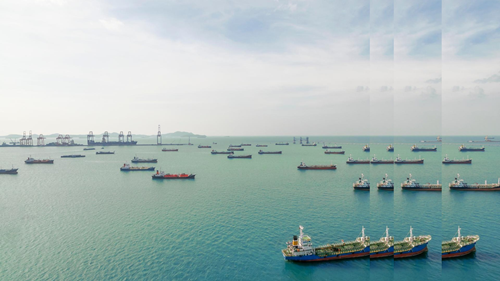CSRD simplifications: First Omnibus package
Many companies have prepared intensively for reporting under the CSRD (Corporate Sustainability Reporting Directive, Directive (EU) 2022/2464). On 26 February 2025, the European Commission put forward two proposals as part of the Omnibus package to drastically simplify the various sustainability reporting requirements. The first proposed amendment is intended to give companies noticeable more time before the CSRD reporting requirement takes effect for them (‘stop the clock’ proposal). A second, more comprehensive amendment to the CSRD would significantly reduce the number of companies required to prepare a sustainability report, and the European Commission plans to strongly reduce the reporting disclosures required.
The Omnibus package also includes simplifications to the CSDDD (Corporate Sustainability Due Diligence Directive) and the CBAM (Carbon Border Adjustment Mechanism).
The key changes at a glance
With regard to the CSRD, the Omnibus package includes the following simplifications in particular:
- Scope of application: The CSRD is only intended to apply to large corporations with an average of over 1,000 employees and either a balance sheet total of over EUR 25,000,000 or net turnover of over EUR 50,000,000.
- Start: For companies that would have been required to report from the 2025 financial year onwards, the reporting requirements will be postponed by two years. Companies required to report from the 2024 financial year onwards will not benefit from a postponement. However, depending on the size of their workforce, they may no longer fall within the scope of the CSRD in the future, in which case the reporting requirement would no longer apply to them.
- ESRS: The European Sustainability Reporting Standards (ESRS) are to be revised and will contain fewer disclosure requirements.
- Trickle-down effects: A further reporting standard is to be developed for companies that are not subject to CSRD reporting requirements. It is intended to limit the amount of information that these companies have to pass on to reporting companies as part of the value chain (value chain cap). This is to prevent non-reporting companies from having to provide more information than they would have to if they themselves were subject to reporting requirements.
- Audit: The audit of the sustainability report is to be carried out only with limited assurance. The European Commission plans to publish guidelines by 2026, to be followed by specific standards. A later increase to reasonable assurance and the development of corresponding audit standards are no longer envisaged.
New scope of application for the CSRD
According to estimates of the European Commission, the Omnibus package is expected to reduce the number of companies required to report under the CSRD by 80% (press release of the European Commission).
Currently, large companies with more than 250 employees and public interest SMEs are required to report under the CSRD. The proposal for a fundamental revision of the CSRD (COM(2025) 81 final) now stipulates that large companies will only be subject to reporting requirements if they meet the following criteria:
- On average, more than 1,000 employees and
- either a balance sheet total of more than EUR 25,000,000 or net turnover of more than EUR 50,000,000.
Small and medium-sized companies would no longer be required to report under the European Commission’s proposal, even if they are listed.
The same new thresholds would also apply to the preparation of a consolidated sustainability report for corporations in the future, according to the European Commission's proposal. Even group parent companies would only be required to report if they have more than 1,000 employees on a consolidated basis and either a balance sheet total of more than EUR 25,000,000 or net turnover of more than EUR 50,000,000.
The European Commission has also proposed adjusting the thresholds for subsidiaries based in the European Union and branches of third-country companies that are subject to reporting requirements. These would only have to prepare a sustainability report if the third-country mother company generates total net turnover of over EUR 450,000,000 in the European Union and the subsidiary is a large corporation or the branch office generates net turnover of over EUR 50,000,000.
New start of reporting obligations
The Omnibus package provides for a two-year postponement of the reporting obligations.
The CSRD currently applies to large listed corporations with more than 500 employees starting from the 2024 financial year (first wave), to all other large corporations from the 2025 financial year (second wave) and to listed small and medium-sized corporations from the 2026 financial year (third wave). In its proposal for amending the CSRD (COM(2025) 80 final), the European Commission intends to postpone the reporting requirement for companies of the second and third wave by two years in each case, so that they would be subject to reporting requirements from the financial year 2027 or 2028 at the earliest (‘stop the clock’ proposal).
Under the additional, more far-reaching proposal for amending the CSRD (COM(2025) 81 final), the reporting requirements would then apply uniformly to all reporting companies from the financial year 2027. This will then only affect large corporations with at least 1,000 employees and either a balance sheet total of over EUR 25,000,000 or net turnover revenue of over EUR 50,000,000 (i.e. some companies from the first and second waves). Small and medium-sized corporations (i.e. from the third wave) would no longer be required to report.
Companies in the first wave, which are already subject to reporting requirements from the 2024 financial year, are not covered by the planned two-year postponement of reporting requirements. In countries where the CSRD has already been transposed into national law, this means that they will initially have to prepare a sustainability report from the 2024 financial year onwards. In Germany, where the CSRD has not yet been transposed into German law, companies will have to prepare a non-financial statement for the 2024 financial year in accordance with the applicable rules in section 289b of the German Commercial Code (Handelsgesetzbuch – HGB) (as reported here). However, according to the German Accounting Standards Committee (Deutsche Rechnungslegungs Standards Committee e. V. – GASC) in a briefing dated 18 December 2024, it is also possible for such companies to use an ESRS-compliant sustainability report as their non-financial statement, provided that it meets the minimum requirements for non-financial statements. The non-financial statement can be prepared using national, European or international frameworks (section 289d of the German Commercial Code). As a delegated regulation, the ESRS do not require transposition into national law and are already directly applicable.
Provided that the European Parliament and the Council of the European Union adopt the amendments to the CSRD from the Omnibus package as proposed and that the German legislature implements the CSRD accordingly into national law, in the future only those companies in the first wave that have more than 1,000 employees would have to prepare a sustainability report. Companies in the first wave with fewer than 1,000 employees, on the other hand, would not be required to prepare either a sustainability report or a non-financial statement.
Fewer ESRS disclosures
The extensive disclosure requirements arising from the ESRS are to be significantly reduced.
The European Commission plans to substantially reduce the number of mandatory data points in sustainability reports under the CSRD and to focus on material and quantitatively measurable data points. The first set of ESRS, published in the Official Journal of the European Union on 22 December 2023 with Delegated Regulation (EU) 2023/2772, is to be revised accordingly.
In addition, there are to be no sector-specific ESRS. The European Commission and EFRAG have so far been working on further reporting requirements for specific sectors, which should define additional disclosure requirements for sustainability reports for over 30 industries. It is quite conceivable that in the future, as part of the materiality analysis, it will still be helpful for companies to take a look at international, industry-specific reporting standards to identify topics for the sustainability report.
Next procedural steps
The European Commission has forwarded its proposals to the European Parliament and the Council of the European Union, calling on them to treat the Omnibus package as a matter of priority.
The debate in the European Parliament on 10 March 2025 showed a mixed response to the European Commission’s proposals. However, the Competitiveness Council, at its meeting on 12 March 2025, tended to favour the simplifications in the Omnibus package.
On 26 March 2025, the Committee of Permanent Representatives of the Member States decided that the President of the Council of the European Union could enter into negotiations with the European Parliament to postpone the CSRD reporting requirements by two years as a first step. The European Parliament, for its part, has scheduled a vote on the urgency motion on the ‘stop the clock’ proposal for 1 April 2025.
It is likely that further or other substantive amendments to the CSRD will be proposed in the European legislative process and that a trilogue procedure will take place. This is an informal procedure between the European Commission, the European Parliament and the Council of the European Union to agree on a provisional compromise text. This compromise text must then be put to the vote and adopted by the European Parliament and the Council of the European Union.
Conclusion and outlook
Although the postponement of the reporting obligations by two years gives companies that will also have to prepare a sustainability report in the future some valuable extra time, companies currently face the question of how they can use this time wisely to prepare. It is not clear how quickly and to what extent the planned changes to the CSRD and, later, the changes to the ESRS will be adopted at the European level and announced in the Official Journal of the European Union. The Member States will then also have to implement the changes to the CSRD in national law. However, for proper sustainability reporting, companies need clarity about the new reporting requirements and sufficient time to develop the necessary expertise and internal processes.
Overall, it seems advisable for companies that are likely to remain subject to reporting requirements to continue their preparations on the existing basis and to monitor the specific simplifications in reporting content on an ongoing basis. In particular, companies that belong to global corporations or have international investors and financial providers should consider voluntarily complying with higher reporting standards if they want to remain competitive and meet their stakeholders’ expectations. This applies equally to companies that will not be required to report in the future because they have fewer than 1,000 employees. They need to consider whether to voluntarily prepare a sustainability report.
Companies in the first wave face the particular challenge of having to prepare their sustainability report for the 2025 financial year again, taking into account the changing circumstances. Here, too, the question arises as to what extent they will modify the sustainability report compared to the previous year or apply the same standards for reasons of transparency.
In any case, it is foreseeable that the reporting effort for many companies in connection with the CSRD will decrease significantly overall. The new threshold of 1,000 employees initially places the responsibility on larger corporations to report on their sustainability strategy and objectives. It is also to be welcomed that an even greater focus is being placed on limiting the scope of reporting by companies which only indirectly have to provide information on sustainability aspects as part of the value chain of reporting companies.
For more information on our Environmental, Social & Governance (ESG) advisory services, please click here.
For more information on our Supply Chain Compliance advisory services, including the German Supply Chain Due Diligence Act (LkSG) and CSDDD, please click here.
For more information on our Energy & Infrastructure advisory services, please click here.
Well
informed
Subscribe to our newsletter now to stay up to date on the latest developments.
Subscribe now










